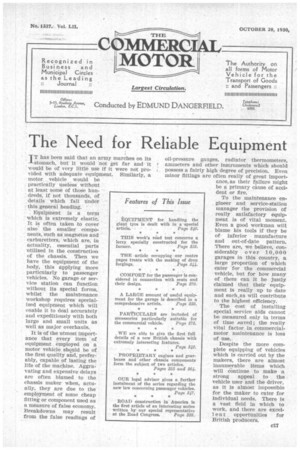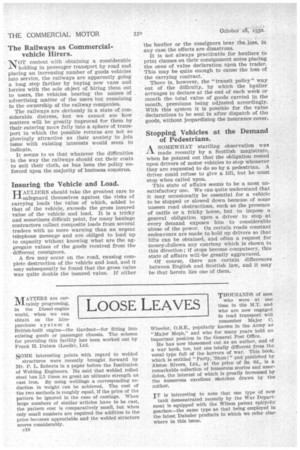The Need for Reliable Equipment
Page 75

Page 76

If you've noticed an error in this article please click here to report it so we can fix it.
Equipment is a term which is extremely elastic. It is often taken to cover also' the smaller components, such as magnetos and carburetters, which are; in actuality, essential parts utilized in the construction of the chassis. Then we have the equipment of the body, this applying more particularly to passenger vehicles, No garage or service station can function without its special forms, whilst the maintenance workshop requires specialized equipment which will enable it to deal accurately and expeditiously with both large and small units as well as major overhauls.
It is of the utmost importance that every Rein of equipment employed on a• motor vehicle should be of the first quality and, preferably, capable of lasting the life of the machine. Aggra..; vating and expensive delays are often blamed to the chassis maker when, actually, they are due to the employment of some cheap fitting or component used as a measure of false economy. Breakdowns may result from the false readings of oil-pressure gauges, radiator thermometers, ammeters and other instruments which should possess a fairly high degree of precision. Even minor fittings are often really of great importance, as their failure might be a primary cause of accident or fire.
To the maintenance engineer and service-station manager the provision of really satisfactory equipment is of vital moment. Even a good workman will blame his tools if they be of inferior manufacture and out-of-date pattern. There are, we believe, considerably o ver 10,000 garages in this country, a large proportion of which cater for the commercial vehicle, but for how many of them can it be justly claimed that their equipment is really up to date and such, as will contribute to the highest efficiency.
The cost of installing special service aids cannot be measured only in terms of time saved; the really vital factor in commercialmotor maintenance is loss of use..
Despite the more complete equipping of vehicles which is carried out by the makers, there are almost innumerable items which will continue to make a strong appeal to the vehicle user and the driver, as it is almost impossible for the maker to cater for individual needs. There is a vast field in which to work, and there are excellent opportunities for British producers.
• The Railways as Commercialvehicle Hirers.
'MOT content with obtaining a considerable holding in passenger transport by road and placing an increasing number of goods vehicles into service, the railways are apparently going a long step farther by buying new vans and lorries with the sole object of hiring them out to users, the vehicles bearing the names of advertising matter of the users but remaining in the ownership of the railway companies.
The railways are obvionsly in a state of considerable distress, but we cannot see how matters will be greatly improved for them by their entering more fully into a sphere of transport in which the possible returns are not so glowingly attractive as their anxiety to join issue with existing interests would seem to indicate.
It seems to us that whatever the difficulties in the way the railways should cut their coats to suit their cloth, as has been the policy enforced upon the majority of business concerns.
Insuring the Vehicle and Load.
HAULIERS should take the greatest care to safeguard themselves against the risks of carrying loads the value of which, added to that of the vehicle, exceeds the gross insured value of the vehicle and load. It is a tricky and sometimes difficult point, for many haulage contractors collect composite loads from several traders with no more warning than an urgent telephone message and are obliged to load up to capacity without knowing what are the aggregate values of the goods received from the different consignors.
A fire may occur on the road, causing complete destruction of the vehicle and load, and it may subsequently be found that the gross value was quite double the insured value. If either the Muller or the consignors bear the loss, in any case the effects are disastrous.
It is not always practicable for hauliers to print clauses on their consignment notes placing the onus of value declaration upon the trader. This may be quite enough to cause the loss of the carrying contract.'
There is, however, the " transit policy" way out of the difficulty, by which the haulier arranges to declare at the end of each week or month the total value of goods carried In the month, premiums being adjusted accordingly. With this system it is possible for the value declarations to be sent in after dispatch of the goods, without jeopardizing the insurance cover.
Stopping Vehicles at the Demand of Pedestrians.
ASOMEWHAT startling observation was made recently by a Scottish magistrate, when he pointed out that the obligation rested upon drivers of motor vehicles to stop whenever they are requested to do so by a pedestrian. A driver could refuse to give a lift, but he must stop when called upon.
This state of affairs seems to be a most unsatisfactory one. We can quite understand that it may occasionally be essential for a vehicle to be stopped or slowed down because of some unseen road obstructions, such as the presence of cattle or a frisky horse, but to impose a general obligation upon a driver to stop at every demand exposes him to considerable abuse of the power. On certain roads constant endeavours are made to hold up drivers so that lifts can be obtained, and often a request for moneyAfollows any courtesy which is shown in this direction ; if stops become compulsory, this state of affairs will be greatly aggravated.
Of course, there are certain differences between English and Scottish law, and it may be that herein lies one of them.




















































































































































































